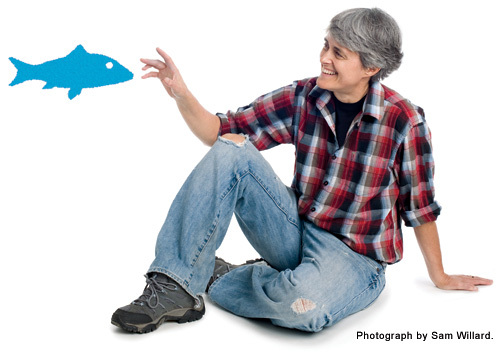Fish of a Different Color: Pat Schmatz’s novel ‘Bluefish’ features some unforgettable characters | Under Cover
Thirteen-year-old Travis can’t read. To make matters worse, he’s moved to a new town far from his beloved woods. But when he meets good-hearted, outgoing Velveeta, his life takes an unexpected turn. It’s a perfect story for you to write, given that both your parents were reading teachers.
My father grew up struggling with reading. He was an outdoors guy, and all he cared about was the woods and the swamp. As a kid, he really had a terrible time with school. I heard a lot around the dinner table about kids who didn’t read. And it was always assumed that those kids could learn to read. It was the teacher’s job to figure out how to make that happen. So I grew up with that idea bouncing around in my head.
How do you write so compassionately about screwups like Travis’s grandfather?
He’s kind of a careless, pissed-off drunk. I guess I have a lot of sympathy for people. Part of it is the fact that I myself am a recovering alcoholic. So I’ve listened to hundreds and hundreds of stories over the years of people who have behaved very badly and feel very bad about it and who really want to make it right and really don’t know how. You know, people don’t behave badly because they want to be jerks. And yet children, especially, are so affected by others’ bad behavior. I really loved writing about the relationship between Travis and Grandpa because, of course, I knew from the beginning that Grandpa wanted to do better.

You create strong, convincing characters, like supersmart Bradley, Mr. McQueen the reading teacher, and Connie, who gives Velveeta a key to the town library. Are you like any of them?
Where I really snuck myself in is in Connie, who’s a very small-rural-town librarian. I actually worked in our town’s rural library for a while when I first moved back to Wisconsin. She was a chance to have somebody a little outside the small-town circle, who would be able to make a difference and who’s crazy about books.
Why’d you move back to Wisconsin, after 25 years of living in places like Berkeley, CA, and Minneapolis?
I grew up on a lot of land, because my parents owned a summer camp. We had 17 acres, and when my father died, my mom passed them over to me. And that land, which has a swamp and woods, was like a huge magnet calling me back. It’s a perfect place to write. It’s so beautiful. Much of the time that I was working on Bluefish, I spent sitting in a canoe in the middle of the lake or walking through those woods or sitting on the edge of the swamp where Velveeta and Travis sat.
On the surface, Bluefish is about a kid who struggles with some huge challenges. But what’s the story really about?
Actually, a friend of mine, who had a really hard time reading growing up and who the book is dedicated to, told me many drafts in, “Well, Pat Schmatz, you’ve written a love story.” I go, “It’s not a love story.” And she goes, “Yes, it is.” And at that point, I realized that it really was not about romantic love so much as a love story of small kindnesses and connection. What the story is really about is the connection that comes when you pay attention enough to really see somebody—those moments when you just see that one glimpse and go, “Oh! There you are.”
RELATED
The job outlook in 2030: Librarians will be in demand
The job outlook in 2030: Librarians will be in demand
ALREADY A SUBSCRIBER? LOG IN
We are currently offering this content for free. Sign up now to activate your personal profile, where you can save articles for future viewing






Add Comment :-
Be the first reader to comment.
Comment Policy:
Comment should not be empty !!!